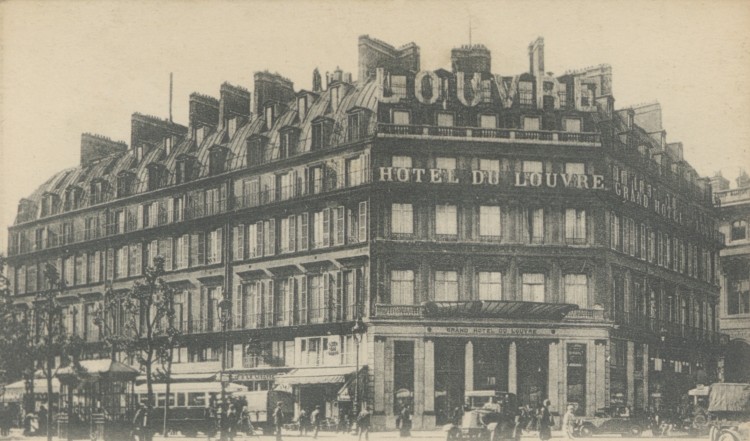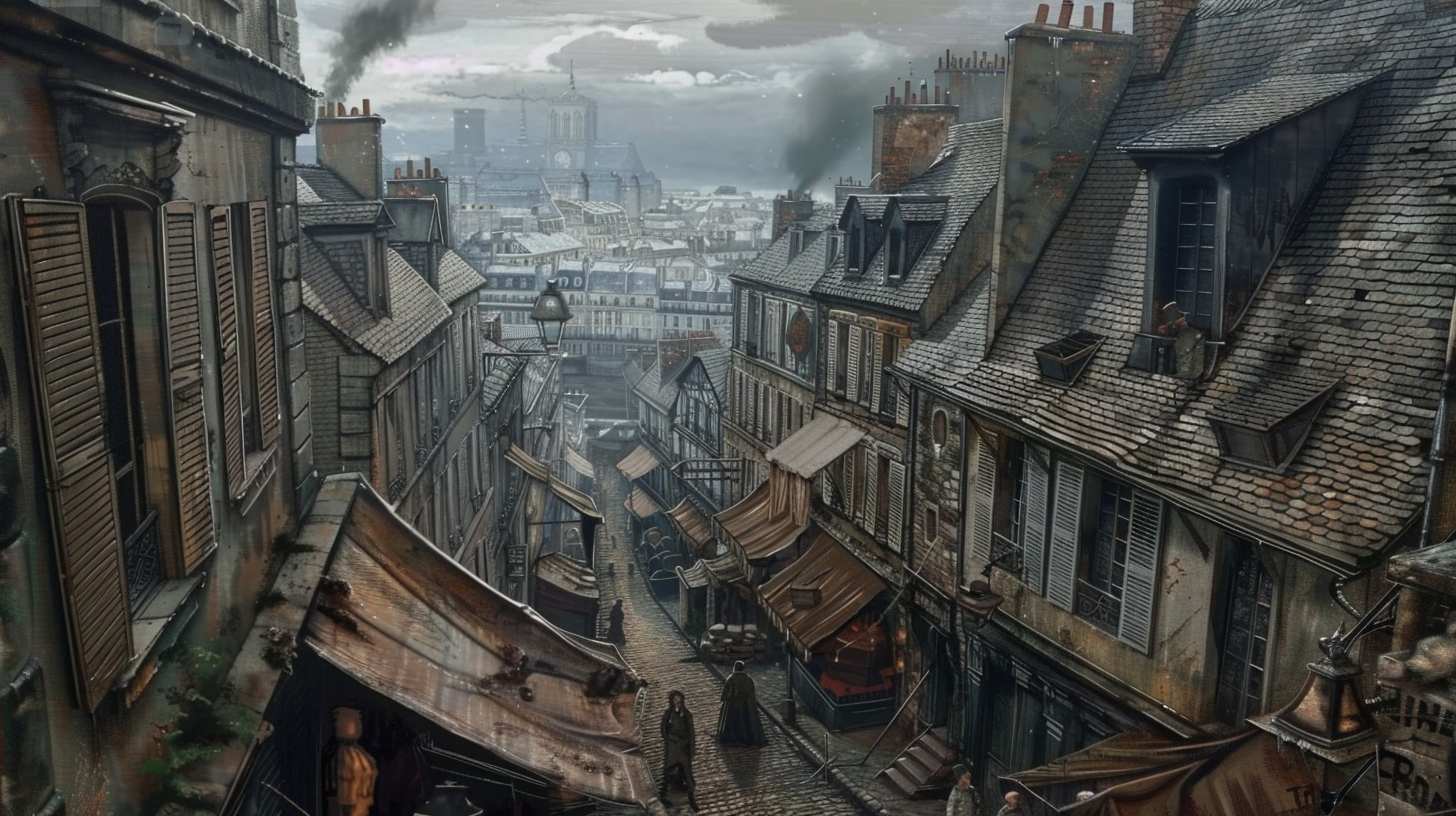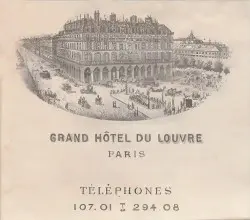
Credits: Hôtel du Louvre - (Credit: Public Domain)
Hôtel du Louvre
The Louvre in Paris is the largest art museum in the world. So if you fancy a cultural visit to the museum, you shouldn't waste too much time getting there and back. One address you could consider is the »Hôtel du Louvre« - which is aptly named. This choice of accommodation will not save you any money on your travel budget - on the contrary.
Paris makes it very difficult to write whimsically about its hotels. Most of the rooms in the affordable range are more reminiscent of cages for laying hens than comfort rooms. Although they regularly have the word "comfort" in their name. Those who like larger rooms might also be disappointed at the »Hôtel du Louvre«: The cheapest offer for one night on the first weekend in March is a 20 m2 room - for a lousy 616 euros - fortunately, breakfast is already included for 60 euros for two people. The size is fine and the price probably has to be taken - location plus the classification as a five-star hotel.
Joseph Van Damme had the status of a quasi-prisoner when he arrived in Paris with Maigret. This was to be expected after his escapades on the journey from Reims to the capital. For the businessman, the procedure on the quai was extremely humiliating. He, who was used to traveling by plane and staying in the best hotels, consuming every luxury on offer, needed a place to stay after the "treatment" that would restore him.
The hotel is just around the corner from the commissioner's former work home. So a little reality check: how plausible was it that the company boss from Bremen would stay in the hotel?
Long story
The answer is uncharacteristically given at the beginning and without further ado: yes, absolutely. The man had the money to stay there and the hotel already existed. That fits. Quite atypically, there is no »but« at all. Nevertheless, we shouldn't miss the opportunity to turn back the clock. The Louvre did not always have the radiance that we assume when we look at it today.
For a time, it was the seat of the French kings, but they moved to Versailles in the 17th century, leaving Parisians with a half-finished building that had to be taken over by the city and further developed. As the royal lords and their state no longer needed to be in Paris, they no longer had to keep an eye on what was developing around the Louvre. This was not appetizing.

After the Louvre was turned into an art museum following the Revolution of 1789 - another of Napoléon's projects - the surrounding area came to the attention of Emperor Napoléon III around 1855, who wanted to do away with the gloomy alleyways and instructed the great urban redeveloper Haussmann to fix up the area. This is how the Rue de Rivoli was created. It was also the ruler's express wish that large hotels be built in the area to accommodate celebrities.
The first to be built on the Magistrale between the Opera and the Louvre was the »Grand Hôtel du Louvre«. Over a thousand employees are said to have looked after the travelers, who could spend the night there in around seven hundred rooms. They not only took care of the accommodation, but there was also something like a chauffeur service, you could book guides and interpreters, there was a bureau de change and a concierge service worthy of the name. There was also a restaurant that was to gain an excellent international reputation. With all its services, the hotel was something like a Google on legs.

Briefkopf »Hôtel du Louvre«
Credits: Public Domain
Now the restaurant was not only a special feature at the time, but also the fact that stores were located in the building. Over the next twenty years, there were more and more luxury stores, so that at some point the hotel building was more of a shopping center than a hostel.
In 1887, the hotel was moved to the Place du Palais-Royal and was once again allowed to be what it should be: a place for tired tourists to sleep. With luxury, of course.
That hasn't changed to this day. The hotel now belongs to a management company in Luxembourg, which was provided with money from Qatar and is now presumably transferring it back to Qatar. It receives the money from the American hotel chain Hyatt, which runs the establishment today.
The guest
Simenon not only accommodated the businessman from Bremen in the hotel. It was also to play a role in another case: Mr. Nahour had been murdered. When his wife landed back in the city, she went to the scene of the crime - which was their home - and explained that she would not be staying there overnight.
»Which hotel are you going to? The Ritz?«
»Oh no. That would bring back too many memories ... Wait, what's the name of that hotel on the corner of Rue de Rivoli near Place Vendôme?«
»Hôtel du Louvre?«
»Yes, that's what I mean. We're going to the Hôtel du Louvre.«
Lina Nahour had come from Amsterdam with her friend Anna Keegel, whom she now had in tow. At the request of the lady of the house, the maid was also part of the entourage that was to stay at the hotel. This must have been expensive fun, even though the hotel provided servants' rooms, which were usually located in less attractive corners of the building and were smaller and more simply furnished.
But the deceased husband had not exactly been poor.
So readers' worries about Madame's household budget are misplaced. Madame Nahour had not called the accommodation to ask if they were fully booked, but had gone straight there in a cab. Together with Lucas, he drove after the ladies and watched as they asked for rooms and then brought in their luggage. Only then did Maigret go into the hotel:
His investigations often took him to small bistros or the noisy bars around the Champs-Élysées, but rarely to luxury hotels.
This was an opportunity for Maigret to treat himself to a beer in one of these »sheds«. Not much time had passed, perhaps Maigret had finished his beer, when the detective was put through to Madame Nahour's room and asked if he could interview her. But she was taking a bath, which is why her friend was on the phone. Maigret asked if he could come by in ten minutes for an interview - and to be honest: ten minutes to get out of the bath, get dressed and get ready? What possessed the detective?
The answer was crystal clear: not in that short time, of course, and that gave Maigret and Lucas the opportunity to grab a bite to eat. The hotel had a grill restaurant. The description gives an idea of how comfortable the two of them must have felt:
A few minutes later, Maigret and Lucas went into the Grill Room, where the atmosphere was just as subdued as in the bar, with the same oak paneling, wall lamps and small lamps on the tables. Only three or four were occupied.
There was whispering like in a church, and the manager, head waiter and waiters were strolling around the room like altar boys.
When he was handed a long menu, Maigret shook his head.
»A sausage platter,« he mumbled.
»For me, too.«
»So two cold cuts,« said the head waiter.
»And beer.«
»I'll send the sommelier.«
A place where you can order a beer from a sommelier ... no, you have to. Great! It goes without saying that the final coffee after the meal was not brought by the waiter. The brown pick-me-up was served by a man in Turkish national dress.
During the subsequent interrogation, Maigret took the opportunity to look around Madame Nahour. He asked her for permission to enter her bedroom. So she had opted for a suite and not a cheap twenty-square-meter room for 600 euros.
After the interview, Maigret did not take his beer in the sleeping palace but went to a bistro.
A crime scene
The hotel is also mentioned in the story "The Death Penalty". Maigret had to deal with a case in which a Belgian count was murdered in room 318. The detective had a suspect, but he was unable to prove the crime. Adalbert d'Oulmont's nephew was a slippery eel. Simenon therefore decided to follow him to Brussels. There was a showdown in another hotel.
In this episode, the hotel only plays a minor role: Simenon could have chosen any other luxury hotel in Paris as the scene of the crime. After all, he was only interested in showing how wealthy the murdered man had been.




